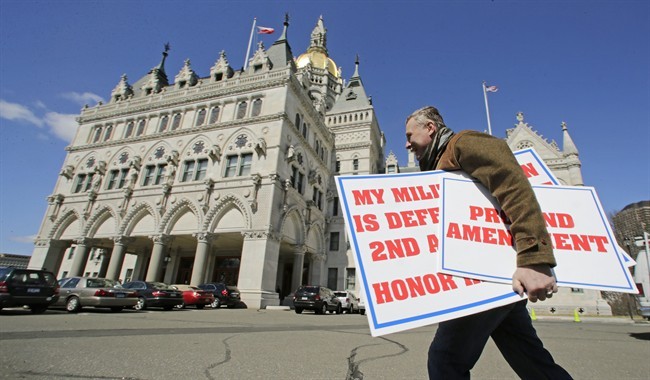TORONTO – About four months and more than 3,000 gun deaths after the Newtown shootings that devastated the small Connecticut town, U.S. politicians are talking gun control measures in earnest.

As debate gets under way, Canadian gun-control experts are watching to see what lessons the U.S. takes from its northern neighbour.
Background checks
While those buying from licensed firearms dealers have been subject to a background check since the early 1990s, people buying from private sellers do not get checked. A key aspect of this debate is whether to keep records, and for how long.
That worries Solomon Friedman, an Ottawa-based firearms lawyer
“If the government keeps records of those background checks, what they’ve done then is create a gun registry,” Friedman said. “Which in Canada we know, besides being an expensive failure, was also used as a means to confiscate firearms and harass gun owners.”
Michael Bryant, former Ontario attorney general and gun control proponent, disagrees.
“The background check is about the user of the gun, the registry focuses on the gun itself,” Bryant said. “A gun registry is not even on the table in the U.S. Politically, I’m told, it’s a non-starter.”
Friedman said that could be because the United States has been paying attention to the fate of Canada’s long-gun registry.
“I think that there are many American legislators who have been able to point to the Canadian experience as sort of being an example of the folly of registration,” Friedman said. “It’s unfortunate to be leading by example in that category.”
Regardless, Bryant doesn’t think universal background checks will be the solution. He believes the United States will still be far behind Canada in terms of gun control.
Assault rifle ban
Not a smart move, Friedman warns: He says a gun is deemed an assault rifle based solely on what it looks like.
“All it does is categorize firearms by physical appearance, not by function or lethality. So in other words if you have a gun with a wood stock that looks more like a traditional hunting rifle, it may do the very same thing as a gun made out of black plastic with a pistol grip that happens to look scary,” Friedman said.
“But to anyone who knows anything about the mechanics of firearms, there’s no difference in the danger posed by those items.”
In Canada some assault weapons are legal: The Conservative government has not added any new weapons to the prohibited list based on appearance only, a decision Friedman recommends the United States takes as well.
Magazine capacity limits
Limiting the number of bullets a magazine can carry is another of Obama’s proposals. High-capacity magazines have been used in every recent mass shooting in the United States.
Canada already limits magazine capacity to 10 rounds in handguns and five in most rifles, but Friedman says this limit can be tampered with.
“Anybody who wants to have a full-capacity magazine simply needs to spend about eight seconds with a power drill and that rivet is removed and all of a sudden it’s rendered full capacity,” Friedman said.
“So the only people who are going to be complying with this law are people who don’t want to cause harm.”
Even if all of Obama’s proposals are accepted, Bryant doesn’t believe this will put the United States on par with Canada.
“All the background checks do is bring the United States into the 20th century, but they’re still a century behind the rest of the world when it comes to gun laws,” Bryant said.
He suggests making it harder to get guns by reducing the quantity available: “There’s just so many,” Bryant said. “The number of guns in the United States is more than three times than that of Canada.
But much of the difference between guns in Canada and the U.S. comes down to mindset, he said.
“For me the biggest difference between the debate in Canada and the United States lies in the acceptance in the United States that guns are a legitimate form of protection for the average citizen,” Bryant said. “In Canada the legitimate, lawful and I think politically accepted uses of a gun are hunting, competitive target practice and collection. You can’t buy a gun in Canada on the basis that you’re using it for protection.”



Comments